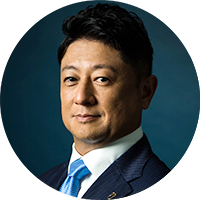Coach's VIEW is a business column authored by executive coaches in COACH A, aimed at providing valuable insights and effective approaches for leveraging coaching to foster organizational and leadership development. The column draws on the latest coaching trends and data, as well as insights from notable global publications on coaching.
White Space Attracts Good Fortune

In May 2024, I completed a 4-year and 3-month assignment in Bangkok and returned to Tokyo. Managing the Thai office for four years was challenging as we aimed to expand our business in ASEAN. Initially, leaving behind the team and our progress in Bangkok was hard for me, but those feelings have since faded.
It has been about a month since my return. I am enjoying time with my family, savoring grilled fish, fresh veggies, and catching up with old friends at a hot spring resort. I am gradually settling back into my routine.
Even after being back home, I have kept up with the walking habit which I developed in Bangkok. The other day, while strolling with my wife, she mentioned feeling overwhelmed by the information overload in her yoga classes which she started joining. Her words reminded me of advice from my former superior after one of the events in Bangkok.
The Cookie Tin Packed to the Brim
After a successful event in Bangkok, where many guests expressed their satisfaction, I spoke with my superior to discuss how we could do even better next time. My superior said,
"Hiroshi, try to leave more room for flexibility and creativity in the overall plan in future."
The event was successful and both customers and team members were satisfied. Given that, I could not quite grasp what my superior meant.
However, as I heard my superior describing my operation as "like a cookie tin packed to the brim," I realized that I had planned every detail meticulously, leaving no room for spontaneity or creativity for the team.
I have always believed in providing detailed explanations to ensure understanding and cooperation. However, by over-explaining and micromanaging, I might have stifled the team's ability to think for themselves. If they had more freedom to interpret and reflect on the plans, the event could have been even better. This realization made me see the value of allowing space for independent thinking and creativity.
When we talk about "white space," we are talking about the empty areas on a page where there is no text or pictures. Just like in writing, having mental and emotional "white space" lets us process information in our own unique way. This space allows us to absorb ideas, think about them, and grow. It is in these quiet moments that we learn, develop, and maybe even create our own stories.
If we truly want to help someone grow, it is important to give them room to think, interpret, and understand information for themselves. It is not just about teaching or memorizing; it is about letting them digest and make sense of things. Without this mental "white space," we might miss out on the joy of crafting our own narratives. The feedback from my superior back then still holds meaning for me today.
White Space Invites Serendipity
After getting that feedback, people started saying that I seemed "relieved" for some reason. Looking back, I do feel more relaxed than before. Maybe it was the word "white space" from my superior that gradually made a difference. I realized I used to think I had to explain everything clearly when working with my team. I think Ihave been letting go of my old habits bit by bit. By leaving room for flexibility and gaps, things have been going more smoothly for both me and others, opening up new opportunities for enjoyment.
However, on the other hand, white space can also be intimidating. When the focus is on achieving results or speeding things up, I find myself almost filling in the white space. The idea of having idle time can be frightening. Despite knowing the importance of white space in my mind, I tend to pack my schedule full like a can of cookies. How will I operate within a completely blank space and give it meaning? It might be crucial to always envision how to make the most of white space.
When I asked ChatGPT about the meaning of "white space," the word "fortune, serendipity" came up last. Reflecting on it, now that I have returned to Japan from Bangkok, this current phase in my career might be a form of "white space." This Tanabata, rather than filling my tanzaku(*1) with wishes, I left them blank and hung them on the bamboo. How do you approach white space in your life?
*1 Tanzaku is a narrow strip of colored paper used for writing wishes during Tanabata, a traditional Japanese festival celebrated on July 7th.
*Regardless of profit, non-profit or intranet, secondary use such as copying, diversion, selling etc. is prohibited without permission.
Language: Japanese

